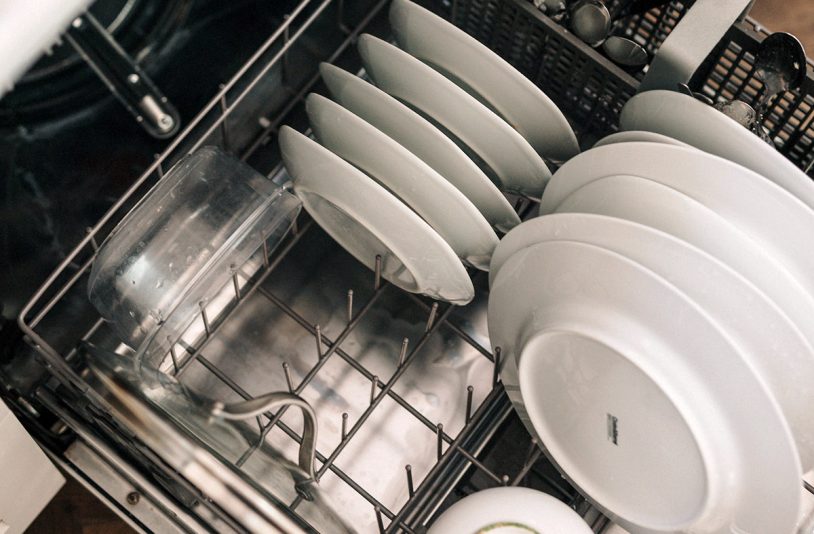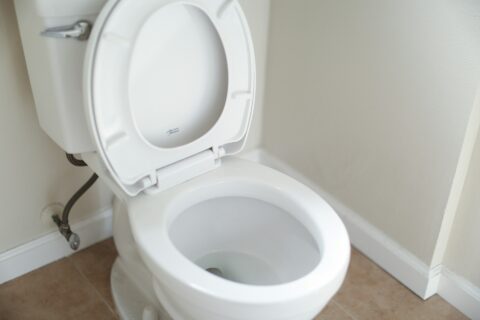
If you’re undecided about using a dishwasher or washing dishes by hand, this article is for you.
Modern dishwashers use less water than traditional handwashing methods, and this piece will explore the pros and cons of each.
This article provides a detailed comparison to help you decide which method is best suited for your kitchen.
Keep reading for surprising facts that might change how you wash your dishes!
Jump to Section [Hide]
Dishwasher vs. Hand Washing: A Comparative Analysis
In this section, we’ll compare dishwashers and hand washing based on water use, cleanliness, cost, impact on hand health, ability to clean tough spots, and environmental impact.
The Efficiency of Dishwashers
Modern dishwashers are highly efficient. They use less energy and water than traditional hand washing. A dishwasher only uses 1.5 to 5 gallons of water per cycle, reusing water during cleaning.
These appliances clean dishes using strong jets to reach tricky places and remove food and stains. When finished, dishwashers clean dishes well and save resources and energy.
This benefits your wallet and contributes positively to better environmental sustainability.
Water Consumption in Hand Washing
Hand-washing dishes often leads to excessive water consumption. Research shows that over two gallons of water go down the drain each minute. That adds up to 20 gallons if you leave the tap running for 10 minutes!
Many individuals adopt practices like the split sink method to tackle this issue. To conserve water, they fill one side of the sink with soapy water and the other with clean water for rinsing. This helps save water compared to constantly running the faucet.
Despite these efforts, hand-washing dishes is less water-efficient than modern dishwashers.
Water Consumption in Dishwasher
Modern dishwashers are much more efficient than hand-washing dishes. The average dishwasher uses only 1.5 to 5 gallons of water per cycle.
Furthermore, Energy Star-rated appliances prove even more efficient. These certified appliances are known for their improved performance and significant savings in water and energy usage.
The faucet flow rate during hand washing can waste over two gallons of water per minute compared to how little dishwashers use. It’s important to be mindful of water consumption.
Cleanliness and Efficiency
Using a dishwasher saves time and effort and ensures cleaner dishes. Modern dishwashers are made to remove food, grease, and stains from dishes, making them sparkling clean.
The dishwasher uses hot water and strong jets to sanitize dishes, killing bacteria and germs. When you wash dishes by hand, you might miss spots or not use hot enough water, making them less clean.
Dishwashers are a better option for keeping your kitchen clean because they are more efficient and hygienic.
Dishwashers are an eco-friendly choice that helps protect the environment by saving energy and water. They also keep your dishes spotless, promoting sustainability.
Water and Energy Usage
Automatic dishwashers are more water and energy-efficient than hand-washing dishes. A test showed that hand-washing dishes used 3.5 times more water than a dishwasher.
When hand washing, an average of over 12 gallons of water is used, compared to the dishwasher, which uses only 2.36 gallons to clean and shine the dishes.
Efficient dishwashers have a complex system of pumps, filters, and spray jets that recycle water while cleaning, making them even more efficient at saving water and energy.
Cost of Purchase and Repair
Dishwashers can be a significant investment, with prices ranging from $500 to $2000. The upfront cost may discourage people from purchasing one, especially if they must consider other expenses like kitchen renovations to accommodate the appliance.
Furthermore, repair costs should also be considered when considering the long-term affordability of owning a dishwasher. Budgeting for potential maintenance and repairs is important when owning a dishwasher for a long time.
Impact on Hand Health
Using a dishwasher can have a positive impact on hand health. Hand washing dishes for a long time can cause skin irritation and dryness, leading to hand eczema.
Using a dishwasher can reduce the risk of developing these dermatological issues. Dishwashers also help reduce hand fatigue by eliminating the need for repetitive movements and gripping while washing dishes.
Dishwashers also reduce the risk of cuts and injuries when dealing with sharp utensils or broken glassware.
Choosing a dishwasher is smart if you want to protect your hands and prevent skin problems from frequent hand washing.
Ability to Target Tough Spots
Dishwashers are impressive at targeting tough spots on dishes. They can remove tough food and stains using strong water jets and hot water.
The water in a dishwasher keeps moving, cleaning tough spots well. This saves you from scrubbing and working harder when washing by hand.
Dishwashers have special features and settings, like intensive or heavy-duty cycles, designed to remove tough spots on your dishes that are hard to remove by hand.
Don’t waste time removing stains at the sink – let your dishwasher do it!
Environmental Impact
Using a dishwasher instead of hand-washing dishes can positively impact the environment. Dishwashers use less water than hand-washing dishes. They use between 1.5 and 5 gallons of water per cycle, while hand-washing can waste over 2 gallons per minute.
Running the dishwasher only when full can save energy, water, and money in the long run. Choosing a dishwasher can also save resources and reduce one’s carbon footprint.
Pros and Cons of Dishwashers
Dishwashers can be more energy and water-efficient, saving time and resources. However, they may also be costly to purchase and repair.
Energy and Water Usage
A modern dishwasher is more energy and water-efficient than washing dishes by hand. It typically uses a gallon and a half to five gallons of water per cycle.
On the other hand, washing dishes by hand can waste over two gallons of water per minute. To be as efficient as a dishwasher and save water, you must wash eight dishes in less than two minutes.
Leaving the tap on for only 10 minutes while washing dishes by hand can waste 20 gallons of water down the drain.
Cost-effectiveness
Using a dishwasher is more cost-effective than traditional hand-washing techniques. It saves time and effort, and modern dishwashers consume less water.
You can save money on your bill and reduce your environmental impact by saving water. Additionally, running the dishwasher only when full can maximize cost-effectiveness and savings.
Choose a dishwasher if you want a cheap and effective method to clean your dishes.
Pros and Cons of Hand Washing
Hand washing is advantageous because it offers flexibility and spot cleaning. It allows you to focus on specific areas that require more attention. However, it also has the potential for water waste if not done efficiently.
Flexibility and Spot Cleaning
Hand-washing dishes is the best option for flexibility and spot cleaning. You have more control over the cleaning process, and it also helps tackle stubborn spots or stains the dishwasher might not remove.
Hand washing is a precise and focused method for removing stubborn food stains and caring for delicate china. Hand washing might be best if you value flexibility and want spotless dishes.
Using eco-friendly dish soap can reduce adverse environmental effects. Remember this.
Hand-washing dishes provides greater flexibility and superior spot cleaning than using a dishwasher. You can fully control cleaning and addressing tough spots or stains directly.
Hand washing allows for carefully cleaning dishes, removing dried-on food, or handling fragile china. This personalized approach ensures precision in the washing process.
Washing dishes by hand instead of a dishwasher lets you control tough stains better and effectively reach tricky corners. This approach also ensures that your dishes are thoroughly spot-cleaned.
Potential for Water Waste
Experts estimate that washing dishes by hand can waste more than two gallons of water per minute. Leaving the water running for 10 minutes while washing dishes by hand can waste up to 20 gallons of water.
This is why it’s important to be mindful of your water usage when washing dishes. To help conserve water, you can use the split sink method. This involves filling one side of the sink with soapy water and using the other side for rinsing.
Doing this allows you to use roughly the same amount of water as a typical Energy Star dishwasher. Don’t rinse dishes before loading them into the dishwasher to make it easier. This can save a lot of extra water.
When to Opt for Da ishwasher and Hand-Washing
When you have many dishes to clean, using a dishwasher is better. It saves energy and water compared to hand washing, especially if you have a full load.
Hand washing can use more than two gallons of water per minute. However, dishwashers are designed to use less water. Don’t pre-wash dishes before putting them in the dishwasher, as this uses more water.
If you have a large family or often host events at home, using a dishwasher can save you time and money.
If you have a small household and don’t produce many dishes, hand washing may be better than using the dishwasher. If you only cook for yourself or live alone, washing your dishes by hand might be easier than waiting for a full dishwasher load.
To save energy and water, just don’t run your dishwasher unless it’s full.
When you have a lot of dishes to clean and want to save energy and water, it’s best to choose a dishwasher. But if you have fewer dishes or don’t use the dishwasher often, it’s better to wash them by hand.
Frequently Asked Questions
Which option is more efficient: using a dishwasher or hand-washing dishes?
A dishwasher is better than washing by hand because it cleans and sanitizes many dishes simultaneously, saving time and water.
Does using a dishwasher save water compared to hand washing?
Yes, using a dishwasher can save water compared to hand washing. Dishwashers typically use less water per load than hand washing.
What about the cleanliness of the dishes? Is one method better than the other?
Both methods can clean dishes well, but studies have proven that dishwashers are more effective in removing bacteria. Dishwashers use hot water and higher temperatures to sanitize the dishes.
Are there any drawbacks to using a dishwasher instead of hand washing?
A dishwasher may be bad for delicate or fragile items that could break in the machine. Some heavily soiled dishes may require pre-rinsing before loading them into the dishwasher.
Final Thoughts
In conclusion, dishwashers outperform hand washing regarding efficiency and water conservation. They use less water and save valuable time. However, certain items still need to be washed by hand.
Consider your specific needs and use the earlier discussion of pros and cons to decide.








